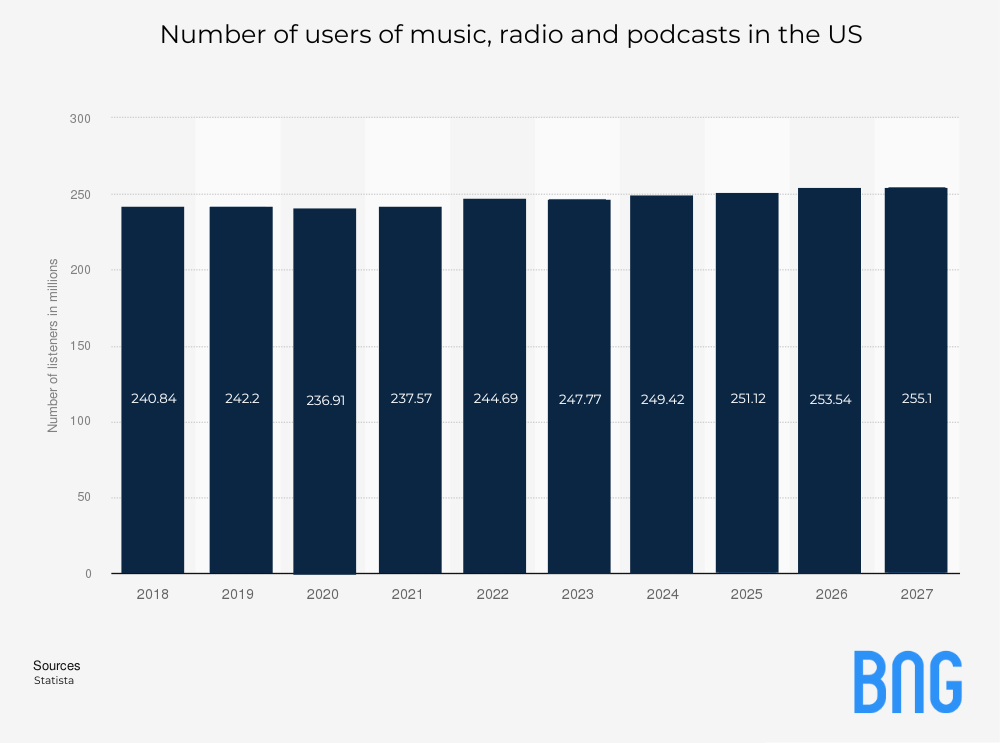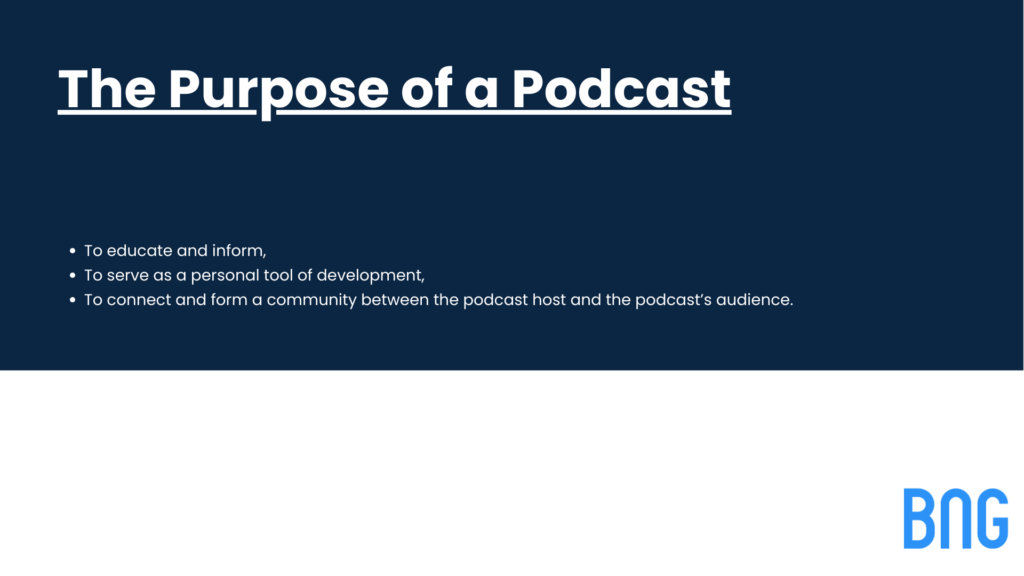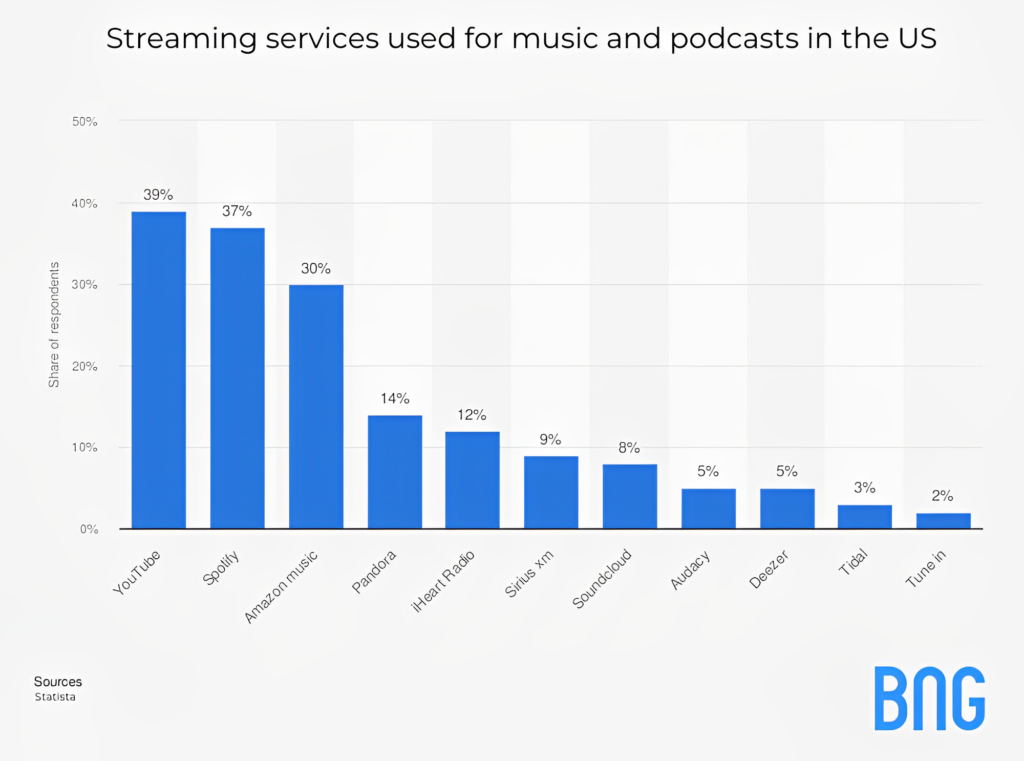What Is a Podcast Definition
Podcasting is a rapidly expanding digital media format. They offer a collection of audio and occasionally video episodes that can be streamed or downloaded over the internet.
These episodes are often grouped by specific themes or subjects, including news, politics, comedy, and storytelling.
Podcast subscriptions are easily managed through specialized apps such as Apple Podcasts or platforms such as Spotify, allowing listeners to enjoy episodes at their convenience.
The increasing popularity of podcasting has made it simpler than ever to discover exceptional content and delve into new subjects, showcasing the versatility and broad appeal of this medium.
Podcast Statistics

Drawing on data from Statista, it’s evident that the awareness of podcasting among U.S. adults has undergone a remarkable transformation.
In 2006, a mere 22 percent of adults were familiar with podcasting. Fast-forward to 2022, and this figure has soared to an impressive 79 percent, highlighting a rising interest towards podcasting as a form of leisure.
As for actual podcast engagement in the US, over 82 million individuals listened to podcasts in 2021, with projections indicating that the audience could exceed 100 million by 2024.
This trend underscores a significant surge in the appeal of podcasts, not just as entertainment, but also as a valuable educational resource.
Starting a Podcast Video Tutorial
If you’re thinking of starting a podcast, but don’t know where to begin, then make sure to check out our ‘podcast how-to’ video below. You’ll have plenty of listeners in no time at all.
What Is the Purpose of a Podcast?
The purpose of a podcast extends far beyond just entertainment. It offers listeners unique content to educate, inform, and inspire its audience on a wide range of topics.
Podcast’s versatility allows anyone to create content on any topic, which is accessible at any time.
Podcasts also provide a platform for individuals to share their expertise and knowledge with the world. Many podcasts feature interviews with experts and thought leaders, providing listeners with unique insights and perspectives.
More than that — podcasts can serve as a tool for personal and professional development, offering listeners the opportunity to learn new skills and strategies.
But perhaps the greatest purpose of a podcast is to foster a sense of community and connection. Podcasts have the ability to bring people together from all over the world, creating a shared experience and a sense of belonging.

MORE: The history of podcasts
What Are The Most Popular Podcast Hosting Services?
Podcast Hosting Services: Statistics

According to Statista, the most popular streaming service used for music and podcasts in the US in 2022 is YouTube.
While YouTube is predominantly recognized for its video content, it has become a favored platform among podcast creators seeking to add a visual element to their audio podcasts.
Following closely in popularity, Spotify stands out as a top choice for podcast streaming. The audio-only platform has gained significant traction, particularly among young adults, due to its affordable subscription options.
Did you know?
Spotify offers an affordable subscription plan, which begins with a complimentary one-month trial and then just $10.99 per month after.
This trend highlights the diverse preferences in podcast consumption, with YouTube and Spotify leading as preferred platforms for visual and audio podcast experiences, respectively.
Amongst some of the less popular podcast streaming services are Amazon, Pandora, iHeart Radio and others.
MORE: How much do podcasters make?
Did you know?
Our free Podcast Name Generator simplifies the process of finding the ideal name for your podcast. Instead of spending hours brainstorming, this tool offers creative and unique name suggestions at the click of a button, saving you time and effort.
What are the 3 Types of Podcasts?
The three types of podcasts are interview podcasts, storytelling podcasts and solo podcasts.
Let’s dive into the three types of podcasts you can find online:
Interview/conversation-based
The first type of podcast is the interview or conversation-based podcast. This type of podcast typically features one or more hosts interviewing guests on a wide range of topics.
These podcasts often feature experts or thought leaders in various fields, providing listeners with unique insights and perspectives.
The conversational format also allows for an engaging and dynamic exchange of ideas and information.
Storytelling/narrative-based
The second type of podcast is the storytelling or narrative-based podcast.
These podcasts are typically produced with a high level of production value and often feature a series of episodes that tell a story or explore a theme.
A storytelling podcast can be highly engaging and immersive, with podcast creators drawing listeners in with compelling characters, plot twists, and cliffhangers.
Solo/monologue-based
The third type of podcast is the solo or monologue-based podcast.
This type of podcast typically features one host who speaks directly to the audience on a wide range of topics.
Monologue-based podcasts can be highly informative and personal, providing listeners with valuable insights and perspectives from the host’s own experiences and expertise.
MORE: Podcast formats
Is a Podcast Different from an Audio File?
To start, it’s important to understand that a podcast is actually a type of audio file. However, not all audio files are podcasts.
An audio file is simply a digital recording of audio, such as a song, a speech, or a sound effect. It can be saved in a variety of formats, such as MP3 or WAV, and can be played on a variety of devices, such as a computer or a smartphone.
A podcast, on the other hand, is a specific type of audio file that is distributed through a feed, allowing listeners to subscribe and receive new episodes automatically.
Podcasts are typically produced in a series, with episodes released on a regular schedule. They often feature a specific theme or topic, and may include interviews, discussions, or storytelling.
So, while both audio files and podcasts are digital recordings of audio, the key difference is in how they are distributed and consumed.
MORE: What equipment do you need to start a podcast?
Are Podcasts Audio or Video?
Podcasts are primarily audio-based, offering listeners a convenient way to consume content while on the go, whether during commutes, workouts, or leisurely moments. While some podcasts may include video elements, such as recordings of live events or interviews, the vast majority of podcasts remain focused on delivering engaging audio experiences.
However, in response to the evolving digital landscape, some podcasters have embraced the multimedia approach, incorporating video elements into their shows.
The multimedia approach includes recording interviews on video and sharing them on platforms like YouTube, enhancing the reach and accessibility of their content to cater to diverse audience preferences.
MORE: How to write a podcast script
Difference Between Podcast and Podcast Episode
| Podcast | Podcast Episode |
|---|---|
| A series of audio (and sometimes video) episodes that are released on a regular basis, often with a specific theme or topic. | A single installment of a series, released as part of the ongoing podcast. |
| These episodes can be downloaded or streamed from various podcast platforms and apps, and are typically part of a larger series of content. | Each episode may feature a different topic, guest, or format, but is part of the larger series and can be listened to in sequence with other episodes. |
So, while a podcast is a collection of episodes, each episode is a standalone piece of content that can be listened to on its own or as part of the larger series.
It’s worth noting that while most podcasts are released in an episodic format, some may be released as a single, standalone piece of content.
In this case, the term “podcast” may refer to the single piece of content rather than a larger series of episodes.
MORE: What makes a good podcast?
Key Takeaways
Now you know the definition of a podcast, the purpose, and the types of podcasts available. If you’re interested in starting your own podcast, and you don’t know where to begin, then look through our list of podcast niche ideas and see what inspires you the most.
Take a look at our free Podcast Name Generator to pick the perfect name once and help you build a successful podcast brand.
Last, but not least, if you’re thinking about starting a podcast, then you may also want to read our guide on how to promote a podcast.